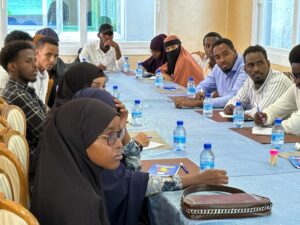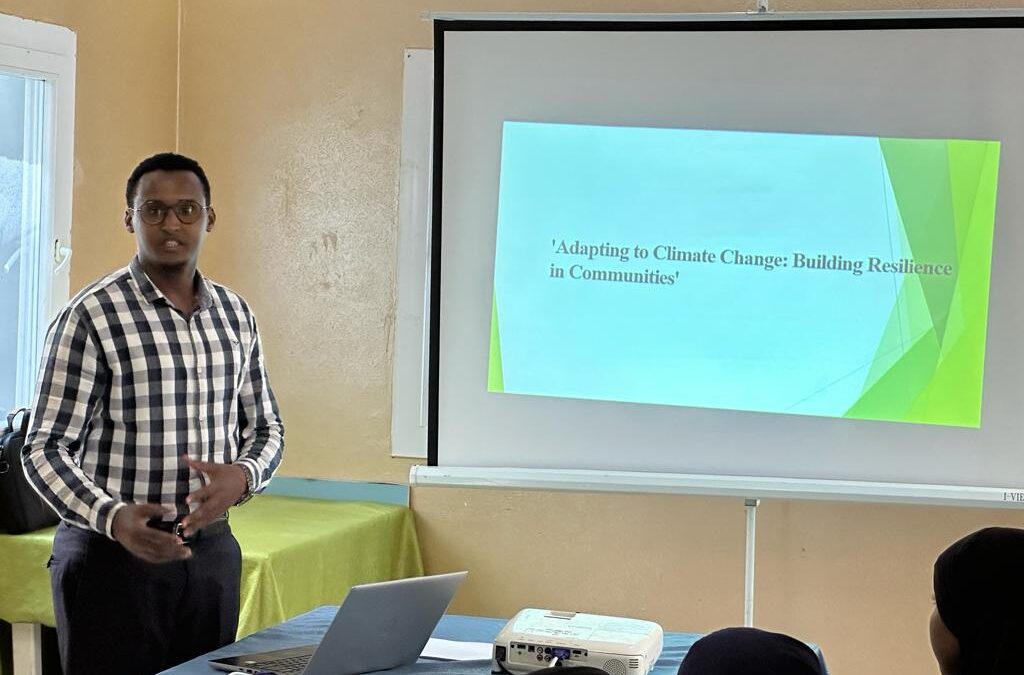
Panel Discussion Highlights Urgent Need for Action on Environmental Degradation in Somalia
Building Resilience: Climate Adaptation Training in Mogadishu, Somalia
In the heart of Mogadishu, Somalia, a groundbreaking climate adaptation training session conducted by Case International has ignited a beacon of hope amidst the challenges posed by climate change. With the ever-looming threat of extreme weather events, rising temperatures, and sea level rise, communities in Somalia are increasingly vulnerable. Recognizing the urgent need for action, Case International orchestrated a comprehensive training program aimed at building resilience and fostering adaptation strategies in the face of these adversities.

Training participant keenly listening to a session by facilitator on Building Resilience
Climate change, driven primarily by human activities such as greenhouse gas emissions and deforestation, has become one of the most pressing issues of our time. Its impacts are far-reaching, affecting everything from food security and water availability to infrastructure and biodiversity. In Somalia, a country already grappling with political instability and economic hardships, the consequences of climate change are particularly pronounced.
The training session, held in Mogadishu, brought together community leaders, government officials, NGOs, and local residents to collectively confront the challenges posed by climate change. Through a series of workshops, seminars, and hands-on activities, participants gained valuable insights into the causes and impacts of climate change, as well as practical strategies for adaptation and resilience-building.
One of the key themes of the training was the importance of understanding the distinction between weather and climate. While weather refers to short-term atmospheric conditions, climate encompasses long-term trends over decades or more. By grasping this distinction, participants were better equipped to comprehend the complex dynamics of climate change and its implications for their communities.
Central to the training were discussions on the causes of climate change, including greenhouse gas emissions, deforestation, and industrialization. Participants delved into the inter-connectedness of these factors and explored ways to mitigate their effects through sustainable practices and policy interventions.
The impacts of climate change were also a focal point of the training, with a particular emphasis on the vulnerabilities faced by coastal communities. Rising sea levels, intensified droughts, and more frequent extreme weather events pose significant threats to livelihoods, infrastructure, and ecosystems. Through interactive sessions, participants examined these risks in depth and brainstormed adaptation strategies tailored to the unique challenges of Somalia’s coastal regions.
Crucially, the training underscored the importance of resilience as a guiding principle in climate adaptation efforts. Resilience, defined as the ability to cope with and recover from setbacks, emerged as a central theme throughout the sessions. Participants explored different dimensions of resilience, including physical, mental, emotional, and social resilience, and discussed how these qualities can be cultivated at both individual and community levels.
Importantly, the training emphasized the need for collaboration and collective action in building resilience. By fostering partnerships between government agencies, civil society organizations, and local communities, participants recognized the power of solidarity in confronting the impacts of climate change.
As the training concluded, participants left with a renewed sense of purpose and determination to tackle the challenges ahead. Armed with newfound knowledge, skills, and networks, they are poised to lead the charge in building a more resilient and adaptive Somalia.
The climate adaptation training conducted by Case International in Mogadishu, Somalia, represents a significant step forward in the fight against climate change. By empowering communities with the tools and knowledge needed to confront the challenges ahead, the training has laid the groundwork for a more resilient and sustainable future. As we look to the days ahead, let us draw inspiration from the spirit of collaboration and resilience that defined this training and continue working together to safeguard our planet for generations to come.

